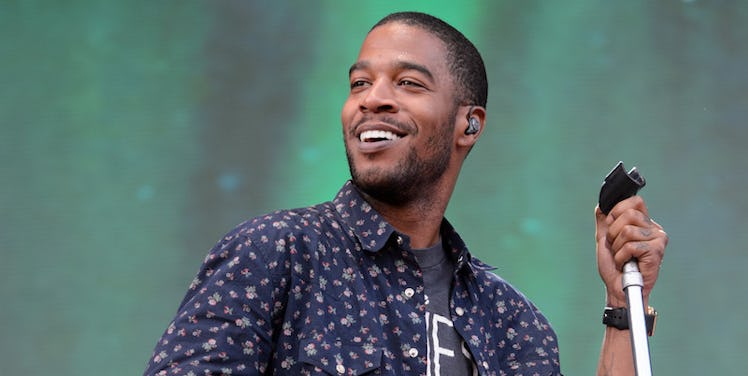
How Kid Cudi Is Helping Black Men Break The Stigma Around Mental Health
A few weeks ago, when musician Kid Cudi announced he'd checked into a rehab facility, I couldn't help but flash a slight grin.
It wasn't because I was happy Mr. Rager was going through such difficulty. No, I was happy he had the audacity to be vocal about something that has always been pretty taboo to discuss as men, and even more so as black men: mental health.
Cudi's revelation sparked one of the better trending topics of 2016. #YouGoodMan only trended for about the better part of a day, but the conversation it sparked was so necessary and long overdue.
Men of all different backgrounds began to talk about mental health, and they seemed to stand in somewhat of a social media solidarity for something we've been taught from a young age to actively avoid.
We're taught to be tough, yet remain cool, calm and collected at all times. We're taught to remain unaffected by the world around us and take whatever comes at us. We're taught to never show too much emotion at all (if any).
For the most part, I tend to agree with those teachings. I can't help it. But the thing is, after a while, it just becomes taxing.
The fact is, we are all affected by life. Some of us struggle with certain things.
A lot of us struggle with our mental health, but we're not encouraged to take action to fix it.
We tear an ACL, we get surgery. We break our arm, we put on a cast. But when it comes to our most vital organ, we, as men, are taught to ignore any problems.
Mental health issues equate to weakness in men in the eyes of many.
Mental health issues equate to weakness in men in the eyes of many.
So, we suffer. But it's really beyond time to break that stigma for good.
My entire life, I struggled with what I now know is Generalized Anxiety Disorder. It affected everything I did, and it honestly cost me a lot of opportunities.
Growing up, I had no idea what the fuck was wrong with me. Something was off. But growing up as a young black boy in a small, conservative town, I wasn't about to see a professional.
See a doctor? About mental issues? Naw, bruh. Not me.
So I found my own ways to try to get around and “overcome” my unknown affliction, namely Hennessy. Many people find all sorts of ways to self-medicate and that heavenly French cognac just so happened to be mine.
It took me a long time and many mishaps to learn there are much healthier and effective ways to deal with whatever I was dealing with.
Mental illness is not something we tend to associate with young black men. And it's not something young black men want to be associated with, for that matter.
But the facts show my demographic is much more likely to suffer from mental health issues than any other.
And yet, we are much less likely to acknowledge it and talk about it. See the disconnect?
The same could be said for men in general, but I'm using my personal experience as a backdrop.
Men of all races, cultures and backgrounds are taught from a young age to be overly macho and pretend to be damn near invincible. It's usually the most broken of us who do the best job at keeping up this façade.
For so many years of my life, that was me.
Mental illness is not something we tend to associate with young black men.
I suffered. I self-medicated. I lost relationships and opportunities because I refused to properly deal with my mental angst.
It wasn't until my college sweetheart demanded we seek relationship counseling or she was out the door that I started to make a change.
Relationship counseling? Baby, are you crazy? Nope. I'm good.
Desperate to keep the only person in my life who even remotely understood me, I went. It proved to be the best decision of my life (arguably, a life-saving one).
I built a great rapport with the therapist even after my relationship ended. I continue to see her to this day, if need be. That same ultimatum won't be given to most guys, however. So many men will suffer in silence and continue to ignore whatever is ailing them.
It's hard to even talk about mental illness, and we have to change that. I was seeing my therapist for four years before anybody other than she and my ex knew I was seeking professional help.
Although I was working through my issues and even though this therapy was saving my life, the stigma attached to having said issues and seeing a therapist was way too ingrained in me to let anybody know what I was going through.
I still struggle, but thankfully, I've reached a point where I am able to write about it.
I want to do my part to help break the stigma and end the cycle of mental anguish so many of us unnecessarily endure. I urge anybody reading this — not just men — to talk to somebody if you're going through something similar.
It does not necessarily have to be a professional, but I at least hope you have one person in your life you can confide in in a safe, understanding, judgment-free zone. I hope you have someone who will never judge your struggle.
It's time to speak up about it, for your sake.
#YouGoodMan?